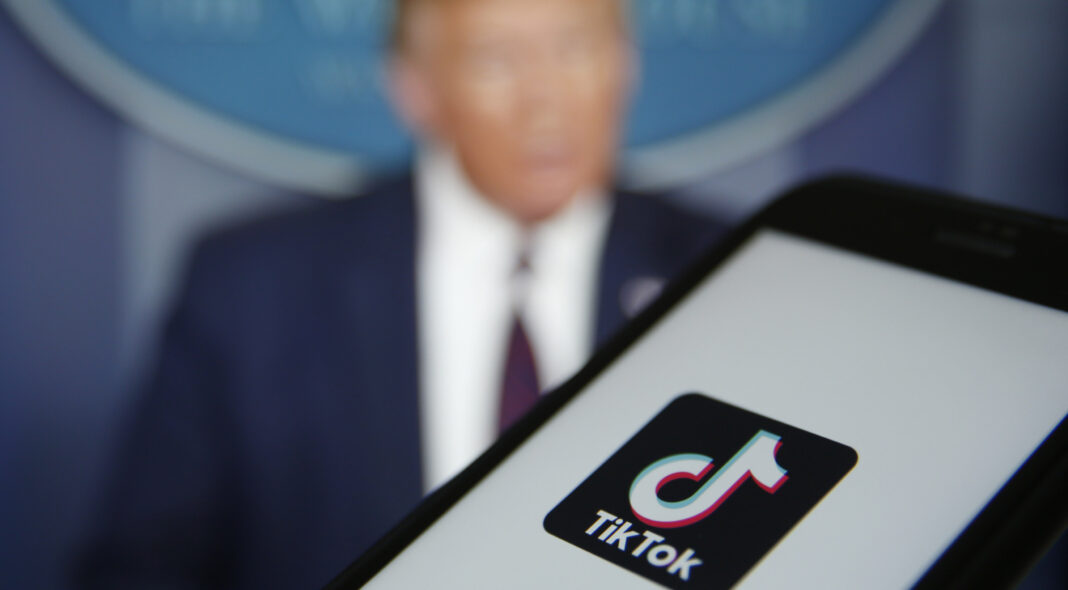If you spend a lot of time on TikTok then it’s likely you have more than a few viral hits bobbing around your brain at any given time. There’s something familiar about hit songs now. By the time you hear them on the radio, or on a Spotify playlist, you’ve already heard them on TikTok. The impact of the app on the music industry is nothing short of monumental. It’s launched careers, changed songwriting and inundated the charts with viral hits from emerging teen artists and international stars alike. Algorithm-driven success from a 15-second clip does not ensure career longevity but it has given a generation of young hit-makers the financial security and exposure to quit their day jobs and focus on music full-time.
Enter Trump, who seems intent on making this year even worse. On 6 August, the President signed an executive order that could ban TikTok – the app that has put a little bit of joy into this disaster of a year – from the US. The ban is ostensibly due to National Security concerns over the Chinese government’s ability to access US citizens’ data via the app. It’s also a significant escalation in the ongoing technology tensions between China and the US and a way for Trump to seem to be taking a strong stance against China in the run up to this year’s presidential election. The ban can only be prevented if a US company buys TikTok before 15 September. They are currently in talks with Microsoft but indications so far are that the deal isn’t going well – Bill Gates called it “a poisoned chalice.” If the deal falls through and no other companies come forward, 85 million American users would be kicked off the app and US companies would no longer be able to advertise on there.
TikTok is a hub for creativity of all kinds. Out of those 85 million US users, many are musicians. From the hopefuls to the viral hit makers to the bona fide superstars, TikTok has become the best tool for music promotion. Who can forget the success of ‘Old Town Road’? Last year’s sound of the summer came from 20-year-old Lil Nas X when TikTok launched the song to the number one spot where it stayed for 19 weeks, making it the longest-running No.1 in US chart history. Since then, Lil Nas X has proved he’s more than just a TikTok one-hit wonder, but this has been as much to do with the creation of a strong online presence as it has to do with his follow-up music. His viral tweets to his 5.2 million Twitter followers mean that he’s now as known as much for his Twitter as for his music.
“TikTok is a great platform for musicians to launch off,” says 22-year-old producer and songwriter Lonely God whose song ‘Marlboro Nights’ blew up on TikTok a year after its initial release. “I went from 20,000 Spotify listeners to 100,000 a month later and two months later, a million.” At first, he didn’t know why his monthly listeners were going up so rapidly. Then someone tipped him off in the music video YouTube comments, saying they found the song on TikTok. “I was like what the hell is TikTok? I downloaded the app and I was like, the song’s popping off here, man.”
‘Marlboro Nights’ made it to number 37 in the Billboard charts and all the way to the top 10 in Spotify’s Viral 50 charts. TikTok plays are not counted towards the Billboard charts because you don’t hear the full song on the app, but they are counted in Spotify’s Viral 50 and Spotify streams count towards the charts. ‘Marlboro Nights’ now has over 50 million Spotify plays and has been used in over 300,000 TikToks, some with millions of views. While TikTok does have the power to send a single stratospheric, some artists don’t want to only be known for success based on an algorithm-driven 15-second clip of their music. Curtis Waters, the musician behind TikTok’s outfit video trend song ‘Stunnin’’ said on Instagram this week, “I do not care about being famous n [sic] I do not care if I have a hit again. It’s awesome that stunnin is blowing up, but honestly im just glad that I can make music for the rest of life without ever having to make sandwiches again.”
READ MORE: TIKTOK’S BIGGEST HITS
Similarly, Lonely God was working as a busboy in a restaurant before his song went viral. Now, he has a record deal and makes music full-time. TikTok changed his life. “I really can’t think of any negatives about having TikTok take ownership of the song because I still get the exposure,” the artist explains. “They all get to hear my song and get influenced by it. I’m expanding my fan base and I’m making money. It’s really just a blessing.”
“When I was making ‘Marlboro Nights’, I wasn’t thinking, is the music I’m making gonna be commercially successful?” he explains. “I was just making music that I wanted to make. Now, I’m not necessarily chasing the same path that ‘Marlboro Nights’ took but I’m definitely more cognisant of how my target audience, which is people on TikTok, young adults and teens, how they’ll receive it instead of how much I’ll like it. If a song I write connects with my listeners, it’s gonna be on TikTok because there’s a lot of crossover there. I try to make a song that connects with people and hopefully they think hey, this song is awesome. Let me post a TikTok with it.”
The impending ban could mean success stories like Lonely God’s become less common. “I know it’s not the first thing the government thinks of but TikTok is really a career creator that helps a bunch of kids get ears on their music and other types of talent too,” he says. “It would be a pretty big loss if it’s banned. But before TikTok there was Vine so I think with this generation there will always be some kind of short form social media. Instagram Reels has the exact same features now, but it’s different.”
Launched earlier this month, Instagram launched Reels which allows users to effectively make ‘TikToks’ on Instagram, but it feels different. Its main problem is that while TikTok brings the content to you through its ‘For You’ page, on Instagram Reels you have to go to the content. It’s easy to forget that Reels even exists and most of the videos on there so far are re-uploads from TikTok. You can even see the TikTok watermark left on them.
Instagram is known for being a highlight reel of people’s lives and lacks the authentic DIY expression that Gen Z has managed to cultivate on TikTok. There’s more of a community feel to TikTok and, according to Billboard’s chart manager, Kevin Rutherford, this is what makes it able to influence chart music on such a huge scale. “Anyone can sign up and make a video on TikTok,” he says. “This participatory nature is an added boost that can really drive a previously obscure song into the stratosphere. In a way I think it’s got some sort of secret club-like mentality to it too – radio didn’t tell us to like this song, we found it on the app all our friends are on and turned it into a hit ourselves. And we had fun while doing it. There’s a lot of elements that join together to make it a super formidable place to discover new music and create new hits.”
TikTok has made chart music much more democratic. In the past, Rutherford says, “The decision to play hit songs [on the radio] was ultimately in the hands of a minuscule part of the population. With viral hits from TikTok and elsewhere, it’s in the hands of the general populace. To me, that makes these one-hit wonders more meaningful than many of those in decades past.” Rutherford estimates that at least six of this year’s Billboard No.1 hits were based on success on TikTok – “‘Watermelon Sugar’, ‘Savage’, ‘Say So’, ‘Rockstar’, ‘Toosie Slide’, and ‘The Box'” – but adds that, “it’s difficult to say, because just about every song these days has some degree of presence on TikTok.”
Regardless, TikTok has undeniably dominated the charts this year. Imagining a future without it, they could look very different. However, Rutherford does not think the ban will change anything massively: “It’s all a matter of where TikTok users in the US head if they have to stop using the app, and chances are they’ll make their way somewhere else where they can keep doing what they’re doing.” It is likely that musicians will move to a new app if TikTok is banned and perhaps Zuckerberg has swooped in at just the right time with Reels. The ban could even be an equaliser for emerging musicians and make having a hit less reliant on a memeable 15-second clip. It could even see a more diverse breadth of artists top the charts.
We reached out to TikTok about what the ban could mean for the future of chart music but they declined to comment. They did say however that they are making a concerted push into the UK music scene which suggests that TikTok will continue to be a hit-making machine with or without the US. In May this year, they formed an associate partnership with the Music Managers Forum (MMF) enabling artist-focused music services to build direct relationships with a network of more than 850 UK-based managers. A representative from TikTok told us that, “labels and artists alike are increasingly turning to TikTok as part of their marketing and promotional strategy. This is growing month-on-month both at a local level and globally.” In TikTok’s official statement in response to the executive order they wrote that, “TikTok will be here for many years to come.” Whether or not this turns out to be true, the flotilla of catchy pop songs the app has launched to fame will be stuck in our heads long past September 15.




